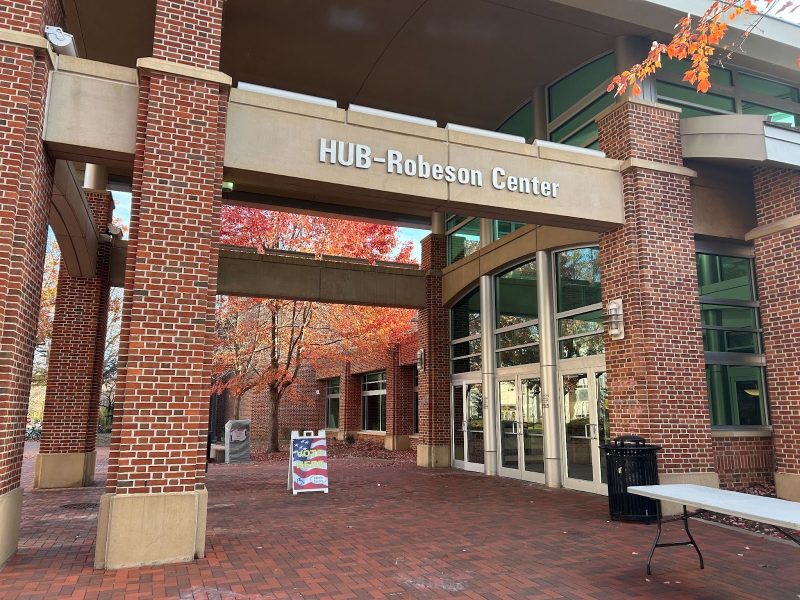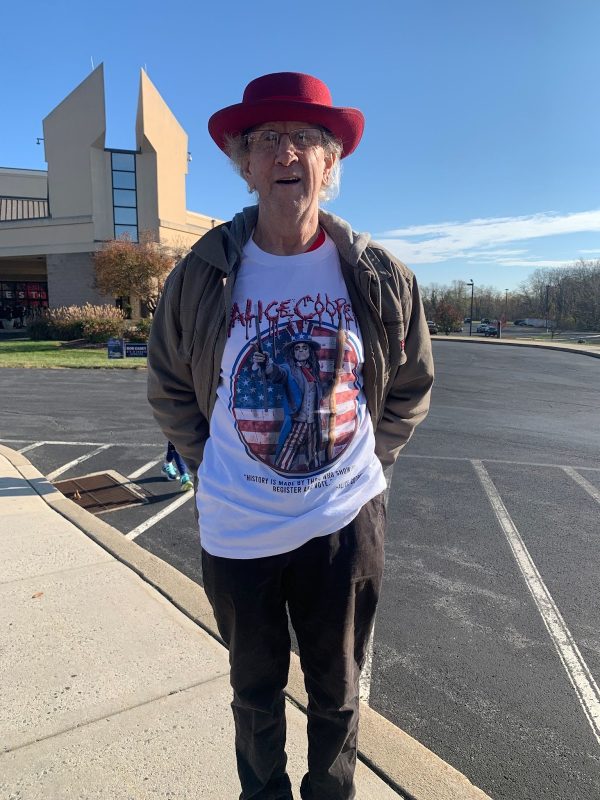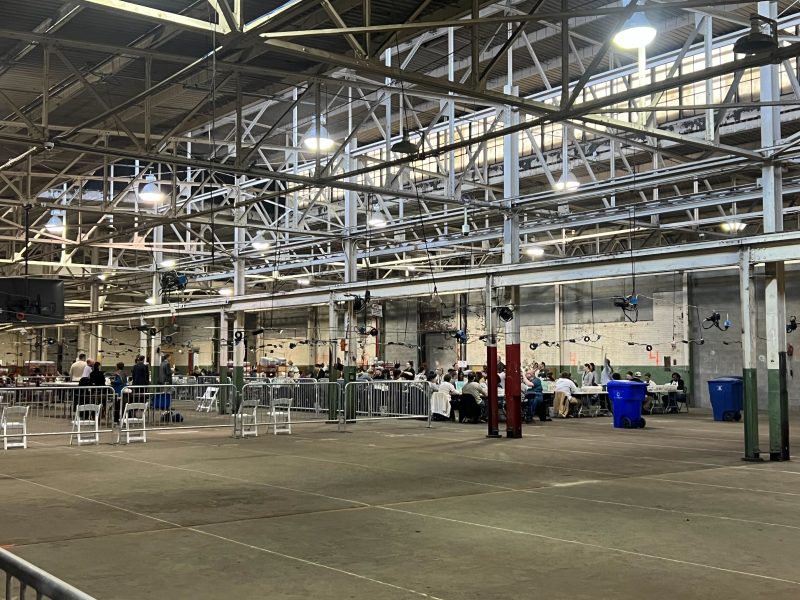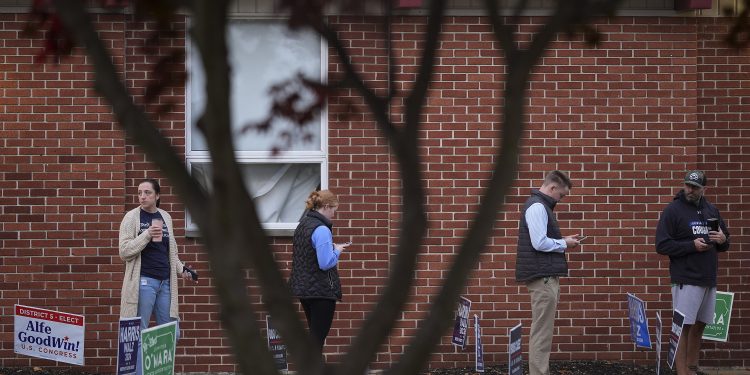See the latest updates from Pennsylvania as voters pick a new president, attorney general, and more.
Spotlight PA Staff
It’s Election Day in Pennsylvania.
A team of Spotlight PA reporters will fan out across the state to talk to voters, attend candidate events, and bring you the latest on how the election is proceeding. You can find those updates below. As always, please donate to Spotlight PA if you appreciate this vital reporting.
Preparing to cast your ballot? We have a complete guide to everything you need to know, as well as information about the candidates for U.S. Senate, attorney general, auditor general, and treasurer.
Officials are warning the public to be patient, as it may take days to have unofficial results depending on how close the races are. The Associated Press will begin reporting results when the polls close at 8 p.m. — find those here.

College Democrats, Republicans make their final cases
10:15 a.m.
Voters at Penn State’s University Park campus slowly filed into the HUB-Robeson Center, asking PSU Votes — a nonpartisan university-run organization — for help finding their polling place or where to return their mail ballot.
Meanwhile, students operating tables for the campus Democrats and Republicans promoted their respective political parties and candidates.
Ryan Klein, 21, serves as president of the Penn State College Republicans and voted in person for former President Donald Trump early Tuesday morning. This is the first presidential election Klein, who grew up in Reading, has voted in, and he said the economy motivated his decision to support Republicans — including Dave McCormick for U.S. Senate and U.S. Rep. Glenn Thompson — down the ballot.
“Prices are extremely high. Rent, gas, groceries — these things are essential to everyday American life,” Klein said. “They’re higher than they were under the Trump administration, and I think it’s a direct result of bad policy. I feel it’s really important to get the right people in the right offices.”
Nearby, 22-year-old Baybars Charkas, president of the Penn State College Democrats, was stationed at a table promoting their candidates and passing out merch.
Charkas was fourth in line to vote at his downtown polling place Tuesday morning. He planned to attend a campaign event for state Rep. Paul Takac tonight, but first, he had to finish an essay due this afternoon.
“You don’t stop being a student,” he said.
Mobilizing voters on Penn State’s University Park campus could be pivotal for both presidential campaigns, though students living on Penn State’s campus have consistently registered but not voted in recent election cycles.
Voters in Centre County’s Precinct 24 (located at Penn State’s HUB) had 36% turnout in the 2016 presidential election, 24% turnout in the 2020 presidential election, but just 15% turnout in the 2022 midterm elections, according to data from Centre County Elections. Registrations for this precinct more than doubled between 2016 and 2020.
As of Nov. 4, there were 21,629 registered voters between the ages of 18 and 24 in Centre County, according to data from the Pennsylvania Department of State. Of those, 9,635 were Democrats, and 6,628 were Republicans. —Marley Parish and Wyatt Massey, Spotlight PA
Plan B voting in Luzerne County
10:06 a.m.
Anne Marie Stiliha drove up to her polling place in Jenkins Township, Luzerne County, and her heart sank.
The line to vote was already dozens deep just a half hour after the polls opened, and the 74-year-old retired teacher has nerve damage from diabetes which impacts her mobility and vision.
“I’ll never be able to stand in line,” she said from her car window.
Stiliha told Spotlight PA that she had applied for a mail ballot three weeks ago. However, it didn’t arrive until this morning.
According to data collected by the Department of State, Luzerne County had among the lowest mail ballot return rates heading into Election Day. As of 8 a.m. this morning, 79% had been returned, the second lowest rate in the commonwealth. The statewide average return rate was at 85%.
Doing the mental math in her head, Stiliha told Spotlight PA she didn’t think she’d have time to fill it out, get to 10 a.m. doctor’s appointment for her sight, and drive herself to return her just-arrived ballot.
Luckily for her, poll watchers noticed her. After a brief wait, she was whisked inside ahead of the line and was able to cast her ballot.
That vote, she said, was for Harris.
“She has a new type of personality that could change the mood of the whole nation,” Stiliha. —Stephen Caruso, Spotlight PA

‘We need to save our country’
9:50 a.m.
Gregory Stoner, 68, showed up at his polling place at Christian Life Assembly in Lower Allen Township, Cumberland County, wearing a red fedora-style hat and one of his favorite T-shirts. It’s emblazoned with the image of rock musician Alice Cooper against the backdrop of an American flag, and the quote: “History is made by those who show up. Register and Vote.”
Stoner, who grew up in nearby Mechanicsburg, said he has been a registered Democrat for most of his adult life, but switched his registration this year to Republican because he no longer wants to be associated with the Democratic party.
His vote today, he said, is unapologetically for former President Donald Trump, as it was in 2020.
“We need to save our country from what’s happened over the last four years,” said Stoner.
He always considered himself a moderate Democrat, he said, but the party has become too focused on progressive issues he does not support. Transgender and LGBTQ rights, he said, top the list of those issues.
“I don’t care what you do after the age of 18, but trying to teach transgenderism in our school systems to 5-year-old children … Walmart selling transgender clothing for children. This is just outright wrong,” he said.
“I don’t even want my name associated with the Democratic party,” said Stoner, who works for the housekeeping department at the area mall.
He said he shows up to vote in person, even though he suffers from fibromyalgia, because he does not trust mail voting.
“As long as I have two hands that still work, and two legs that work, I will always do it in person,” said Stoner. —Angela Couloumbis, Spotlight PA
Concerns about costs, rights
9:44 a.m.
In Jenkins Township, Luzerne County, Shahrooz Pourmonir, 66, cast a vote for Hillary Clinton in 2016. After Donald Trump won, he said he hasn’t cast a vote since.
“Once Hillary won the popular vote and he became president, I thought ‘this is bogus.’”
But eight years later, he stood in a long line outside a Luzerne County firehall ready to vote for Kamala Harris for president at the urging of his three daughters.
All three are in the Coast Guard, and all three were concerned Donald Trump and Republicans would take away their right to an abortion. So, despite his misgivings, the retired bus ticket agent went to the polls.
Thoughts of children and their future dominated many voters’ thoughts in this purple corner of Pennsylvania. Luzerne County has historically backed Democrats, but has increasingly voted for Republicans; it was one of three counties Trump flipped from Barack Obama in 2016 and he still won it in 2020 despite losing the state.
Amy, a 47-year-old pharmacist who declined to give her last name, waited in line with her six-year-old daughter. She told Spotlight PA her biggest issues were the southern border and the economy, which is why she is voting for Trump.
She said she’s felt the impact of immigration in her community, although she didn’t specify how. As for prices, she’s said her household has paid more for nearly every consumer good in the past few years.
“I want some steps to help inflation and make things affordable for working people,” Amy said.
Turning to her daughter, she joked: “Your Cheetos got expensive.”
A registered Democrat, Amy added she planned to split her ticket, but she didn’t specify how.
Another mother, Amy Ditoto, a 38-year-old social worker, told Spotlight PA she was voting for Harris because of concerns for her four-year-old daughter.
A former Florida resident, she’s voted for Republicans before when they are good on immigration and education, naming as an example former Gov. and current U.S. Sen. Rick Scott.
But she’s voting a straight Democratic ticket in Pennsylvania, Ditoto said. She doesn’t want her daughter to “have less rights than I did.”
As for immigration, “I’m not personally affected by it anymore,” Ditoto said. —Stephen Caruso, Spotlight PA
Voting machine issues reported in Cambria County
9:05 a.m.
In Cambria County, voters are experiencing issues scanning their ballots.
County Solicitor Ron Repak told WJAC: “The Cambria County Board of Election learned early this morning that a software malfunction in the County’s Electronic Voting System has prevented voters from scanning their ballots. This should not discourage voters from voting at their voting precincts. The Board has filed a Court Order extending the time to vote within Cambria County.” —Sarah Anne Hughes, Spotlight PA
Outside money pours into state races
8:45 a.m.
State-level races have attracted at least $9 million in independent spending from national political groups, dark money nonprofits, and other well-heeled interests, according to Pennsylvania Department of State records accessed Monday afternoon.
That’s on track to break independent spending in 2020, which reached $9.4 million when the same offices — including Pennsylvania attorney general — were last on the ballot.
Unlike typical campaign giving — in which a political committee or individual donates money, goods, or services to a candidate — independent expenditures are not coordinated with the campaign the donor hopes to aid.
Anne Wakabayshi, a Lehigh Valley-based Democratic political consultant, says such spending is typically done to avoid campaign finance limits, which Pennsylvania does not place on individuals or political committees.
But independent spending has other perks. By not coordinating with a campaign, a political group can take money directly from a corporate or union treasury instead of having to use voluntary donations to a PAC.
Independent spending also makes it easy to hide the ultimate source of the spending, Wakabayshi said, as the spender’s name won’t appear on their favored candidate’s campaign finance report. And finally, it can give the independent spender more control over the message and delivery of the ads.
Still, “in a lot of situations, I don’t know why they do that,” Wakabayshi said.
The single biggest independent spender is Keystone Prosperity PAC, which spent $2.7 million on TV ads and mailers supporting Republican attorney general candidate Dave Sunday.
According to Pennsylvania campaign finance records, Keystone Prosperity has a single funder — the Republican Attorneys General Association, a Washington, D.C.-based political group. The group had given Keystone Prosperity at least $4.8 million as of Oct. 21.
In turn, RAGA’s money has come from a slew of sources, according to data collected by ProPublica. That includes $3.5 million this year from the Concord Fund, a conservative judicial advocacy group, as well as checks from a wide array of business interests, including big tech, fossil fuels, telecoms, and insurers.
Another big independent spender is the PA Chamber of Business and Industry, which has spent $1.6 million on digital ads, TV commercials, and mailers supporting Republican candidates or attacking Democratic candidates. A spokesperson for the chamber did not address questions about how the group spends political dollars, only saying that it supports “candidates who are committed to making Pennsylvania more competitive for businesses to grow, invest, and create jobs.”
Otherwise, independent spending mostly aided Democratic candidates, including from labor unions and environmental groups. The biggest boost came from the Pennsylvania Fund for Change, which spent at least $1.1 million on mailers, TV ads, and phone calls attacking Republicans or backing Democrats.
The group has been active in Pennsylvania legislative elections since at least 2018, and has received much of its past financial resources from PA Alliance Action, a 501(c)4 nonprofit that does not have to report its donors and has funded other Democratic-aligned dark money political spending.
At least 15 different groups reported $1.2 million on canvassing, door knocking, grassroots organizing, and other similar face-to-face voter engagement. Of that, all but $2,400 of the reported canvassing expenses was in favor of Democratic candidates.
Finally, one third party also had a sizable boost from independent expenditures. Forward Party attorney general candidate Eric Settle received $160,000 in supportive text messages paid for by a newly registered group, PA Fulcrum PAC. —Stephen Caruso, Spotlight PA
Abortion access is motivating voters
8:32 a.m.
Shahrooz Pourmoni, 66, holds up a picture of his daughters, both in the Coast Guard, with former President Donald Trump. They begged him to vote for Harris because of abortion. Even though he swore off voting in 2016, he's here to vote for her. pic.twitter.com/fF6Wie2FOk
— Stephen Caruso (@StephenJ_Caruso) November 5, 2024
Nearly 2M mail ballots returned as of election morning
8:28 a.m.
Pennsylvania approved nearly 2.2 million applications for mail ballots. As of Tuesday morning, voters had returned 1.9 million — more than 80%. Of those, 55% were returned by Democrats, 33% by Republicans, and 12% by other voters. —Sarah Anne Hughes, Spotlight PA
A closely divided community
8:20 a.m.
Everett Hamilton was up early this morning, and his first task was to show up at the polling station at Faith Immanuel Presbyterian Church in Lower Paxton Township in Dauphin County.
Two precincts vote at this location, and they are both closely divided between Democrats and Republicans. In 2020, for instance, one of the precincts split 473 to 414 in favor of Joe Biden, according to Dauphin County’s official returns. The other precinct went 905 to 898 — or just 7 votes — in favor of Biden.
The chair of the GOP committee in the township, Hamilton said most of his work ahead of the election was centered around engaging voters on the hotly contested race in the 10th Congressional District between Republican U.S. Rep. Scott Perry and Democratic challenger Janelle Stelson.
This morning, he said, he was there largely to watch the process. He is allowed to talk to voters, as long as he keeps a certain distance from the entrance — but he said he was “keeping my mouth shut.”
No one, he said, wants a paper handout urging them to vote one way or another.
“Normally what happens is, we pass the stuff out, it goes in the trash can,” he said. “Some of them are nice enough to bring it back and say, ‘Here, reuse it.’”
“But for the most part, people have made up their minds,” said Hamilton. “I’ve said, anyone who doesn’t know who they are going to vote for in this election is asleep.” —Angela Couloumbis, Spotlight PA
A college student’s first presidential election
8:15 a.m.
A steady stream of voters trickled into the State College Municipal Building early this morning.
For Olivia Feliciano, a 21-year-old Penn State student, today’s election marked her first time voting for president. Joined by friends at a downtown polling place, she cast her ballot for Vice President Kamala Harris.
“I just think it’s really important to exercise your right to vote. I also am standing with the right to choose, reproductive rights,” she said. “I just feel very passionately about it, so I want to make my voice heard.”
Feliciano said she decided to vote in person because she felt “uneasy” about the mail-in system, citing concerns over ballots being set on fire in three states leading up to the election.
“I just wanted to make sure for my own ease, just to do it in person,” she said. —Marley Parish, Spotlight PA State College
Afraid for the future
7:58 a.m.
Hadley Ross, 15, is too young to vote. Still, she felt it was important to come to the polls this morning with her father, Rob Ross, to watch him cast his vote for Vice President Kamala Harris.
She said politics have always interested her, and has tagged along with her dad on Election Day since she was a young child.
But this year, she said, feels different. More urgent.
“I am just scared that if Trump wins, that rights might get taken away, especially abortion rights,” said Hadley, who lives in Lower Paxton Township. “I don’t know, I’m just really scared and anxious.”
Her father Rob, a registered Democrat, said he came today to vote “his conscience.”
“You could say it’s a vote against Donald Trump, but the truth of the matter is, Kamala is a good person, has good ideas, and will take the country in a good direction,” he said.
Abortion rights — preserving them for the next generation — was a top issue for him, as was “our standing in the world.”
“I don’t feel that the image that Donald Trump puts out is,” he said, his voice trailing off as he searched for the right word.
His daughter finished his thought before he could: “American.” —Angela Couloumbis, Spotlight PA

Processing 1000s of mail ballots in Allegheny County
7:47 a.m.
At 7 a.m., thousands of election workers at a Pittsburgh warehouse began precanvassing the more than 215,000 mail ballots returned in Allegheny County.
Sitting around long tables, the workers began opening envelopes, taking out ballots, and preparing them to be scanned through vote-counting machines.
Pennsylvania is one of a handful of states with widespread mail voting that doesn’t allow its election workers to begin processing those ballots until 7 a.m. on Election Day. The state’s precanvassing policy can contribute to a long wait for unofficial results, though Allegheny County officials previously said they expect to finish counting tonight.
As poll workers began their tasks, a group of partisan volunteers sat in an enclosed pen only a few yards away. These observers were picked by a political party or a candidate and approved by the county election’s office to watch the process. They are not allowed to interact with poll workers. —Kate Huangpu, Spotlight PA
Know your rights
7:30 a.m.
Whether you cast your ballot in person or by mail on Nov. 5, you want to make sure your vote counts. The best way to do that is to know your rights.
>> READ MORE: What you need to know about your Election Day voting rights in Pennsylvania
‘Affordability. Housing. Gas. Food.’
7:26 a.m.
For Brian Allen, 57, who lives in Lower Paxton Township, today’s election was his second time voting for president.
The first was in 2020, and today, he cast his vote for the same candidate as he did then: former President Donald Trump.
His vote, he said, was motivated by this: “A better America for my kids. Affordability. Housing. Gas. Food.”
“He [Trump] did it the first four years for us. We were in a better place,” said Allen.
Allen said he showed up in person to vote because he has no faith in voting by mail. He believes all voters, aside from those living or serving overseas or facing a disability, should be required to come to their polling station — with ID.
“There is better accountability,” he said. —Angela Couloumbis, Spotlight PA
‘Faith in humanity’
7:12 a.m.
By 6:47 a.m., the line outside Faith Immanuel Presbyterian Church in Lower Paxton Township in Dauphin County was more than 30 people deep.
By the time polls opened at 7 a.m., it had doubled in size, even as more cars rolled slowly into the already packed parking lot.
An election clerk, who only wanted to be identified by her first name — Rebecca — said turnout so early in the day this year has far surpassed what she experienced in the 2020 presidential election.
“It’s more and earlier,” she said. “It doesn’t surprise me … People are interested in the direction of the country.”
She wasn’t anticipating problems, even as the line continued to grow.
“I have a lot of faith in humanity,” she said. —Angela Couloumbis, Spotlight PA
The polls are open
7 a.m.
Polls across Pennsylvania opened at 7 a.m. and will remain open until 8 p.m. As long as you are in line to vote by 8 p.m., you are entitled to cast a ballot.
Here’s more of what you need to know to vote today. — Sarah Anne Hughes, Spotlight PA
‘What do I need to bring with me to vote?’
3 a.m.
If this is your first time voting or your first time voting since changing addresses, you’ll need to bring proof of identification. This can include any government-issued ID such as a driver’s license or U.S. passport, a utility bill or bank statement that includes your name and address, or a military or student ID. See the full list of options. — Sarah Anne Hughes, Spotlight PA
How to report a problem while voting or get voting info
3 a.m.
If you need last-minute voting information, you can seek official answers from the Pennsylvania Department of State by calling 1-877-VOTESPA. The nonpartisan Election Protection coalition has its own hotline, as well: 866-OUR-VOTE.
If you need to lodge a complaint about something you experience while voting, you can call the state’s hotline (1-877-VOTESPA) or reach the department using this form.
Still preparing to cast your ballot? Read Spotlight PA’s complete coverage at our Election Center 2024 website. — Sarah Anne Hughes, Spotlight PA
What you need to know before heading to the polls
3 a.m.
For those of you heading out to the polls, here’s what you need to know:
- Polls are open from 7 a.m. to 8 p.m. Double-check your polling place here.
- In addition to nonpartisan poll workers, you may encounter partisan poll watchers who are sanctioned to observe polling places. Here’s what they can — and can’t — do.
- Have a completed mail ballot? You can still drop it off today by 8 p.m. Some satellite offices and drop boxes will close before then, so make sure to look up your local details.
- Have a mail ballot but want to vote in person? Bring all of the materials with you to your polling place.
- Requested a mail ballot but it never came? You can still vote using a provisional ballot.
- If you are facing a last-minute problem and can’t make it to the polls, you may qualify for an emergency absentee ballot. Read about those here.
Like in 2020, be prepared to exercise patience this week and beyond. Election officials can only begin processing mail and absentee ballots this morning, which means it may take days to report the full unofficial results.
Also, beware of mis- and disinformation about mail ballots, voting machines, and more. —Sarah Anne Hughes, Spotlight PA



